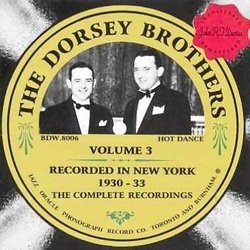| All Artists: Dorsey Brothers Title: Volume 3 Members Wishing: 2 Total Copies: 0 Label: Jazz Oracle Release Date: 3/10/1998 Genres: Jazz, Pop Style: Swing Jazz Number of Discs: 1 SwapaCD Credits: 1 UPC: 620588800627 |
Search - Dorsey Brothers :: Volume 3
 | Dorsey Brothers Volume 3 Genres: Jazz, Pop
|
Larger Image |
CD Details |
CD ReviewsRefuting the myth of "progress" in the arts--and rewriting a Samuel Chell | Kenosha,, WI United States | 07/09/2010 (5 out of 5 stars) "It's common to hear a younger generation of thinkers, artists, poets, musicians, etc., speak of the most recent projects in a particular discipline as having some inherent modernistic quality that not only distinguishes the later work from the earlier one but somehow makes it better, more advanced, more fully "evolved." In the case of the Dorsey Brothers, I'm afraid I was until recently a member of a similar, "born yesterday" generation. It took me just ten years to discover that Louis Armstrong's music was far more than a "period piece." Extensive and attentive listening convinced me that he was one of the great trumpet masters and jazz improvisers of all time. But partly because of a "need" to believe in the idea of progress and partly as an approach to handling life's excessive complexities through instant categorization and dismissal of them (it makes things a lot easier), I was for the better part of a decade content to relegate Louis to the role of an "entertainer" at best.
In the case of the Dorseys, it took more than a decade--closer to half a century. I acknowledged the "golden tones" of the sentimental gentleman of swing and considered his brother Jimmy to be much the same, except the lesser of the two. (I'd heard Tommy back up Sinatra and play smoothly on "I'm Getting Sentimental Over You"; I'd heard Jimmy's last hit recording, "So Rare"--which it wasn't). But now the truth can be heard by all who will listen: both of these guys were virtuoso, prodigious musicians. Neither may have been a seminal jazz improvisor or even the hardest swinger of his time, but either one is capable of exposing the ignorance of those writers and historians who claim that music pyrotechnics was unknown in popular American music until the arrival of Bird and Diz. In Tommy's case, it was his recording "Trombonology" that came as a revelation; in Jimmy's, it was a couple of exceptionally challenging, "toccata"-type pieces that he tossed off like mere child's play: "Bebee" and "Oodles of Noodles." Both are original J. Dorsey compositions, yet it's far easier to find recorded examples of either piece by artists other than Jimmy or Tommy. Fortunately, this recording includes both numbers as played by the originals themselves, thus setting the record straight, especially where Jimmy Dorsey is concerned. In fact, I seem to recall hearing once that Jimmy Dorsey was Charlie Parker's favorite alto player. If so, Bird could not have chosen a better role model." |

 Track Listings (24) - Disc #1
Track Listings (24) - Disc #1